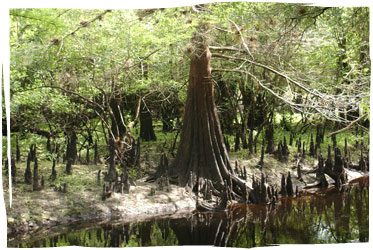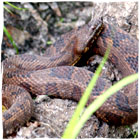Unique Habitat

Diverse habitats such as this creek along the Peace River Basin are dwindling as water is displaced and surface topography is altered by phosphate strip-mining.
All living things in an ecosystem are connected directly or indirectly. Humans are part of the ecosystem and rely on it to provide clean water, recreation and food. For example, the same ecosystems that sustain habitats along the Peace River also serve as major sources of drinking water in Charlotte, Sarasota, and Desoto counties. The wetlands and surface waters of the ecosystem help determine the quality of water below ground and in the river. The upper ecosystem helps determine the health further downstream.
Land Changes & Habitat Loss
According to a 1997 U.S. Geological Survey report, changes in the surface of the earth from mining practices cause significant alterations in drainage patterns. Worse yet, Florida has already lost more than half of its wetlands. Wetlands are essential for balancing an ecosystem. They protect us from flooding by storing water and providing a natural filter for pollutants. Wetlands allow water to seep into the aquifer below, recharging our drinking water supplies. Without them, the various systems they link and the living things that depend on them are lost.Freshwater Inflow & Salinity
Water either seeps slowly underground, or flows over the surface, making its way to coastal waters through the aquifer, creeks, channels and rivers. At the coast, fresh water blends with salt water to create just the right salinity at just the right time of year to support the growth of fish and shellfish at a particular time of their lifecycles. If the fresh water doesn't arrive in the right quality and quantity and at the right time it can affect the populations of those creatures that need it to live or grow.Nutrients and Pollution
Nutrients like nitrogen and phosphorus are found naturally in the environment. But when mining occurs and the timing, volume and quality of water flow are altered, then excessive, unnatural amounts of nutrients can be carried downstream. Too many nutrients in an ecosystem can cause an overgrowth of algae, resulting in the use of too much oxygen and the suffocation of aquatic creatures. Excessive nutrients can cause the loss of grass-beds vital to the survival of fish in Charlotte Harbor.
You can see how the living things-plants, animals and people-are connected in an ecosystem and how disruption at one end of the system can have severe consequences at the other. Harm the wetlands and too much or not enough water can flow downstream. Harm the wetlands and we may be harming our ability to recharge the aquifer and our drinking water sources. Harm the wetlands and our fisheries, wildlife and quality of life can be affected in ways we don't fully understand. Phosphate mining will destroy thousands of acres of wetlands.
We need to know how the industry plans to ensure that our resources will not be harmed in the process.